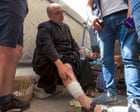
In a world where geopolitical tensions often hover at a simmer, recent developments in the Middle East have highlighted the fragility and complexity of peace in the region. From the solemn halls of a church in Gaza to the contested landscapes of Syria, recent events serve as poignant reminders of both the intensity and the human cost of conflict.
In the early hours of a quiet morning, the Holy Family Catholic Church in Gaza—a sanctuary for hope and relief—experienced devastation. An Israeli strike hit the compound, tragically claiming the lives of three individuals and injuring ten others, including the parish priest. The victims included Saad Salameh, the church’s beloved janitor, Fumayya Ayyad, who sought solace and psychological support within the church grounds, and Najwa abu Daoud, a comforting presence for Ayyad. This church stood as a singular beacon of faith for Gaza’s Catholic community, and this particular act of violence has reignited global calls for a ceasefire, with notable figures advocating for immediate action to halt further bloodshed.
Meanwhile, not far off in southern Syria, the province of Sweida has been engulfed in a wave of violence. Here, the specter of sectarian strife looms large as clashes between Druze communities and Bedouin tribes have left hundreds dead. The Sweida National Hospital, inundated with casualties, underscores the dire humanitarian situation. Many of the wounded and deceased suffered from gunshot wounds and the indiscriminate brutality of artillery shrapnel—grim scars in a region yearning for peace.
Contributing to the complexity of the conflict is the involvement of external forces. Recent Israeli airstrikes have targeted militant positions in Sweida in an effort to quell the violence exacerbated by local power vacuums. The Israeli air force executed operations in response to clashes, including one strike that reportedly affected areas near the Syrian defense ministry in Damascus. This intervention has been met with condemnation from various Syrian factions, accusing Israel of further destabilizing the already precarious situation.
Amid the chaos, the political landscape has also shifted. The Syrian government has accused Israeli interventions of violating sovereignty and complicating the mission to protect the Druze communities. The enduring tensions have highlighted how intertwined local grievances are with broader geopolitical strategies. These events have further underscored the fragility of ceasefire agreements, as accusations of violations persist.
The ripple effects of these conflicts are palpable beyond the immediate regions. Addressing these violent conflicts requires not only the cessation of fighting but also comprehensive dialogue and genuine reconciliation efforts, highlighting the critical need for diplomacy to pave the road to lasting peace. As these crises unfold, the international community’s response will play a crucial role in shaping future outcomes.
In such times, the focus must remain on the pursuit of peace, the healing of communities, and the restoration of hope—a task that demands cooperation, compassion, and unwavering dedication to justice for all involved.
Source: {link}
